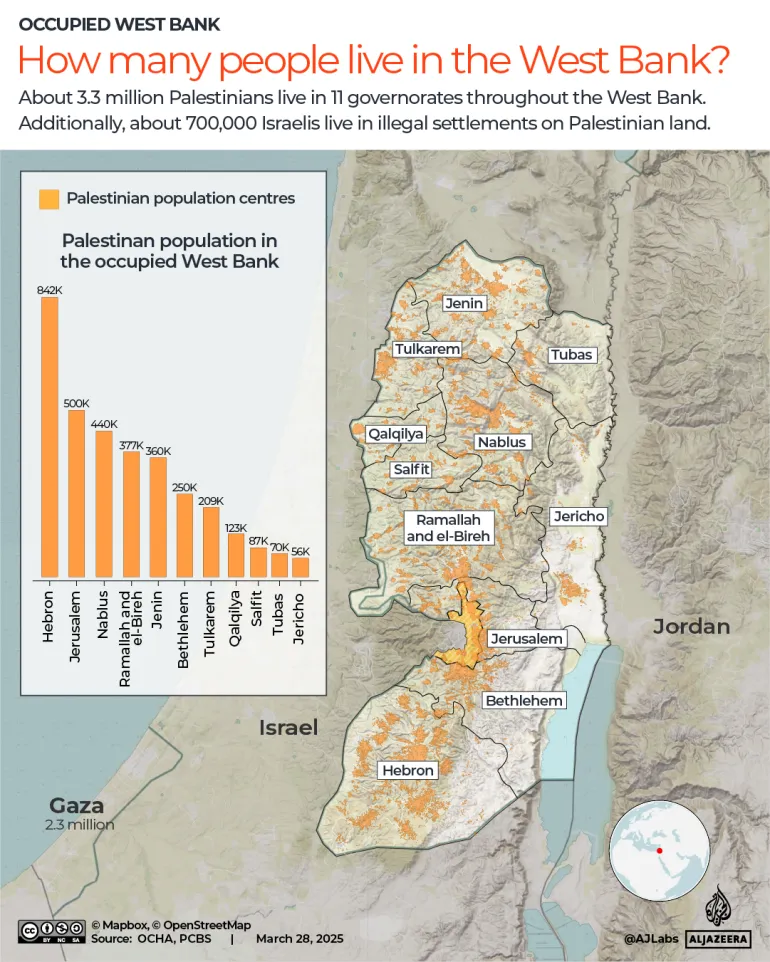Muslim countries slam Israel for ‘illegal annexation’ push in West Bank | Israel-Palestine conflict News
In joint statement, countries urge international community to ‘compel Israel to halt its dangerous escalation’.
Eight Muslim-majority countries have denounced Israel for trying to impose “unlawful Israeli sovereignty” in the occupied West Bank, after it approved controversial new measures expanding its control and making it easier for Israeli settlers to buy land.
Egypt, Indonesia, Jordan, Pakistan, Qatar, Saudi Arabia, Turkiye and the United Arab Emirates condemned Israel’s move “in the strongest terms” on Monday, according to a Saudi Foreign Ministry statement.
Israel’s new measures, greenlighted Sunday by its security cabinet, have major implications on property rights and Israeli security procedures in the occupied Palestinian territory.
The Times of Israel, citing a joint statement by Israel’s far-right Finance Minister Bezalel Smotrich and Defence Minister Israel Katz, said the new rules would allow Jewish Israelis to buy private real estate in the territory and open up previously confidential land registries to the public.
The measures will also allow Israeli authorities to take charge of managing some religious sites and increase Israeli supervision and enforcement in areas run by the Palestinian Authority (PA), according to Israeli media reports.
Smotrich said the move was aimed at “deepening our roots in all regions of the Land of Israel and burying the idea of a Palestinian state”.
‘Dangerous annexation push’
Palestinian President Mahmoud Abbas said the decision amounted to de facto annexation, and called on US President Donald Trump and the United Nations Security Council to intervene.
Al Jazeera’s Nida Ibrahim, reporting from the town of Birzeit in the West Bank, said Palestinians view the development “as the most dangerous push towards annexation and the most critical decision since Israel occupied the West Bank in 1967”.
She noted that under the new rules, there was nothing that would prevent Israeli settlers from owning land and “coming to Palestinian city centres”.
In the joint statement, the eight Muslim-majority countries said Israel is trying to put in place “a new legal and administrative reality” that accelerates its “illegal annexation and the displacement of the Palestinian people”.
The countries affirmed Palestinians’ right to “self-determination and statehood” and urged the international community to “compel Israel to halt its dangerous escalation”.
The European Union also condemned the Israeli move, calling it “another step in the wrong direction”.

The West Bank is among the areas that Palestinians seek for a future independent state, along with the Gaza Strip and occupied East Jerusalem. Currently, much of the West Bank is under direct Israeli military control, with extremely limited Palestinian self-rule in some areas, governed by the Western-backed PA.
More than 700,000 Israelis live in settlements and outposts in the occupied West Bank, which are illegal under international law, while some 3.3 million Palestinians live in the territory.
Israeli forces regularly carry out violent raids, conduct arrests, and impose restrictions in the occupied West Bank, where attacks by Israeli settlers against Palestinians have also intensified, often under the protection of Israeli soldiers.
In January alone, at least 694 Palestinians were driven from their homes in the West Bank due to Israeli settler violence and harassment, the highest number since Israel’s genocidal war against Palestinians in Gaza erupted in October 2023, according to the UN.
